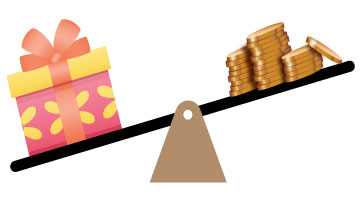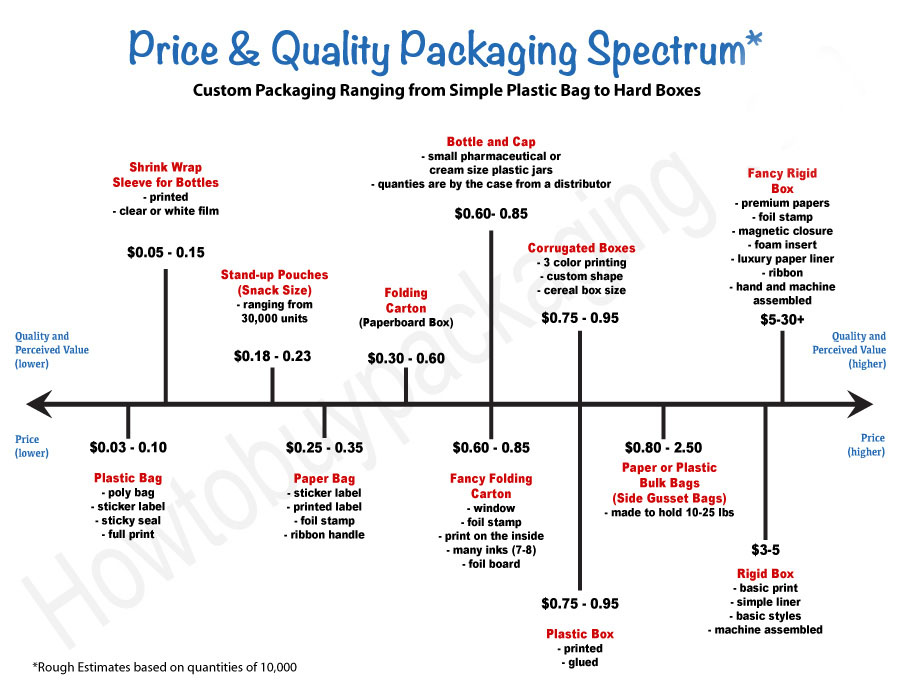How Much Does Packaging Cost?
 How much does packaging cost? Most packaging professionals are hesitant to offer a quick answer. That is because packaging costs vary from one type of packaging to another. Some types of packaging are naturally more expensive than others, but all benefit from higher volumes in order to reach lower unit costs.
How much does packaging cost? Most packaging professionals are hesitant to offer a quick answer. That is because packaging costs vary from one type of packaging to another. Some types of packaging are naturally more expensive than others, but all benefit from higher volumes in order to reach lower unit costs.
And each type of packaging has its set of components that influence costs. Labor, materials, tooling, set-up fees, design work, prototypes, testing, freight, shipping, fulfillment, storage, and of course, volume, are all aspects of packaging manufacturing that add to the unit cost of packaging.
So…How Much Does Packaging Cost?
Because there are so many variables that affect unit cost, and manufacturers, salespeople and brokers are often reluctant to give you an answer to this seemingly simple and straight forward question (and it truly is a tough question to allow for a quick definitive answer) I will attempt to offer some ball-park figures that should give you a rough idea of the cost of different types of packaging.
Boxes
There are three common types of boxes in the world of packaging, folding cartons, rigid (set-up) boxes, and corrugated boxes. Folding cartons tend to be the least expensive, followed by corrugated, then rigid boxes generally being the most expensive.
A good price for a box should be under $1 for a folding carton, and under $2-3 for a fully printed labeled corrugated box, and $4-5 for a rigid set-up box. If I were buying packaging, these would be my goals.
To get to these goals, you have to have the volume or you’ll pay 3-10x per unit. And as packaging is so intrinsically tied to volume, these comparison charts below are focussed on volume vs price. Here is where the balance lies:
Cost of Folding Cartons |
|||
Volume Classification |
Volume (Units) |
Investment $ |
Tooling |
Prototypes |
1 – 100 |
$150 – $450 TOTAL |
$0 |
Short Run |
500 – 1000 |
$1.15 – $1.75 |
$200 – $300 |
Mid Run |
2500 – 5000 |
$0.50 – $0.85 |
$300 – $500 |
Mid-Large Run |
10,000 – 25,000 |
$0.25 – $0.45 |
$300 – $500 |
**Large Run |
50,000 – 100,000 |
$0.08 – $0.15 |
$500 – $850 |
NOTE: Numbers are based on 4 color process printing on 18pt caliper of SBS paperboard. **Volumes larger than this may require a fully integrated packaging supplier to bring your unit cost even lower.
Cost of Corrugated Boxes |
|||
Volume Classification |
Volume (Units) |
Investment $ |
Tooling |
Prototypes |
1 – 100 |
$250 – $1,000 TOTAL |
$0 |
Short Run |
500 – 1000 |
$2500 – $6,000 TOTAL |
$500 – $1600 |
Mid Run |
2500 – 5000 |
$2.50 – $3.00 |
$500 – $1600 |
Mid-Large Run |
10,000 – 25,000 |
$1.25 – $1.75 |
$500 – $1600 |
**Large Run |
50,000 – 100,000 |
$1.10 – $1.15 |
$500 – $1600 |
NOTE: Numbers are based on 4 color process printing, 80# label on 200# E – C fluted kraft material. **Volumes larger than this may require a fully integrated packaging supplier to bring your unit cost even lower.
Cost of Rigid Boxes |
|||
Volume Classification |
Volume (Units) |
Investment $ |
Tooling |
Prototypes |
1 – 100 |
$250 – $5,000 TOTAL |
$0 – $1,200 |
Short Run |
500 – 1000 |
$5 – $10 |
$500 – $1200 |
Mid Run |
2500 – 100,000 |
$5 |
$500 – $1200 |
NOTE: Numbers are based on 4 color process printing, 80# laminated label mounted to 60pt grey chipboard. Prices remain constant in spite of increased volume as rigid set-up boxes involves a lot of hand labor.
Flexible Packaging
Flexible packaging refers to any of the following: bags, stand-up pouches, woven poly.
Pouches and other flexible packaging have much higher minimum volume requirements than folding cartons for example. The lowest minimums that I commonly see are 5000 units for roll-stock, 10,000 units for a bread bag, and 25,000 units for a finished pouch. Price ranges can be anywhere from $0.25 for 25,000 units, and $0.75 for the 5000 roll-stock.
Cost of Flexible Packaging |
|||
Volume Classification |
Volume (Units) |
Investment $ |
Tooling |
Prototypes |
1 – 10 |
$250 – $500 TOTAL |
$0 |
Short Run |
5000 |
$0.75 – $1.00 |
$500 – $1500 |
Mid Run |
25,000 – 100,000 |
$0.25 – $0.50 |
$500 – $1500 |
Large Run |
100,000 + |
$0.05 – $0.25 |
$800 – $1800 |
Thermoform Packaging (Blister Packaging)
Blister packs involve two types of materials: the backer cards that are paper based and the blister itself that is a thermoformed plastic container.
The thermoform is the deciding factor, where 1,000 units is extremely expensive, about $2-3 for just the thermoform tray. You may want to consider at least 5000 units to have a good price for a blister pack, and you’d still be looking at about $1.50. This is because this type of packaging also involves someone to insert your product before they seal the blister pack. So either the manufacturer of the blister packaging must do it or another company that does fulfilling and has blister pack machinery.
Cost of Blister (Thermoform Tray Only) |
|||
Volume Classification |
Volume (Units) |
Investment $ |
Tooling |
Prototypes |
1 – 10 |
$4 – $5 Each |
$500 |
Short Run |
50,000 – 100,000 |
$0.08 – $0.11 |
$4000 – $5000 |
Mid /Large Run |
100,000 – 500,000 |
$0.04 – $0.06 |
$4000 – $5000 |
Additional Thoughts
Besides the number of colors printed, materials, volume, and size of your packaging, another major factor that affects unit cost is the size of the machinery.
Smaller machines require smaller, less expensive tooling. Larger machines have larger tooling costs, however, these costs usually means a smaller total unit cost because you can fit more units on a larger piece of tooling, if that makes sense. So a larger folding carton cutting die can cut out a greater number of boxes with each motion.
The last and most significant factor is where the box is being produced, North America (USA, Canada, Mexico) or Asia (China, Taiwan, India). The chart reflects USA manufacturing only.
Any add-ons to enhance the packaging will shift all of these numbers, from 10% and up to 50% or more.
If you do not have a budget that fits any of this, your product’s volume may not be ready for custom packaging.
The following price and quality packaging spectrum is designed to give buyers, at a glance, a rough idea of how much packaging costs. This spectrum ranges from simple plastic bags to rigid boxes and is based on quantities of around 10,000.


